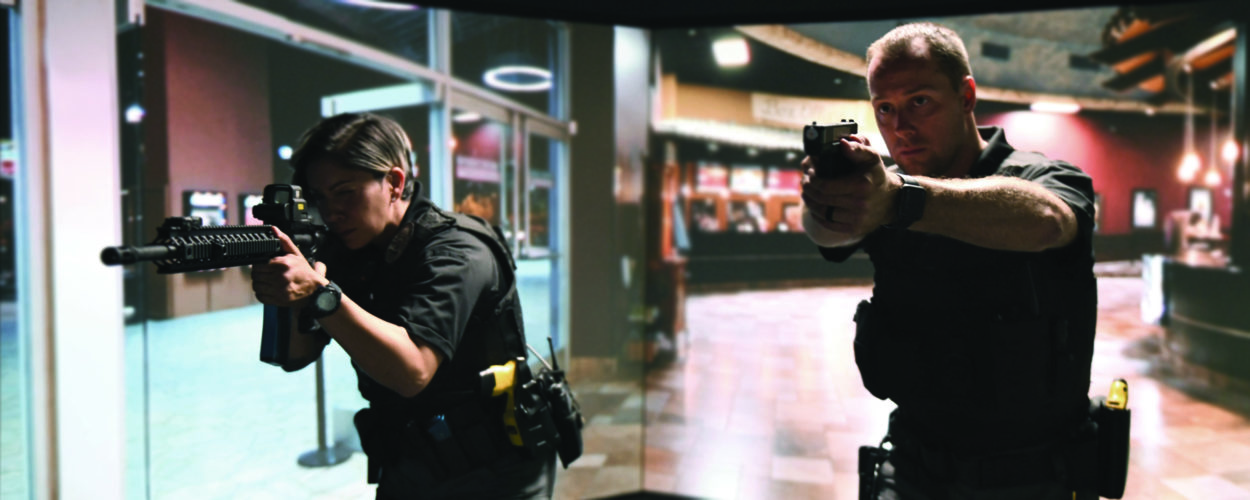
Police academies and departments across the nation utilize a wide variety of methods and strategies to train new law enforcement officers. This can consist of roleplaying, lectures, trips to the range and so forth.
While each form of training has its benefits, they all fall short when utilized alone or siloed. This is because many training methods cannot account for the unpredictability officers will experience in the field, nor do they realistically immerse the trainees in the given scenario. This is why VirTra’s immersive simulators, such as the VirTra 300-degree judgmental use of force law enforcement simulator, provides a far more effective training.
The immerse quality is more than the physical immersion, though the V-300’s five screens do physically immerse trainees and officers, once they step into the simulator. Rather, immersion is taken to the next level with surround sound audio and integrated and interactive characters on each screen. In addition to this are the accessories: the Threat-Fire® provides real-life consequences and stress inoculation while VirTra’s recoil kits and CO2 magazines allow officers to utilize their personal firearms within the simulator. Instructors can take advantage of these immersive qualities to train officers in a variety of real-life situations from a safe, controlled and realistic environment.
Working Through Uncertainty
Law enforcement officials must work with unprecedented levels of environmental and situational unpredictability. After all, it’s a part of the job. While it is possible to account for some of the variables an officer might face, it is impossible to account for every variable in every situation, every day.
While lectures are important—after all, discussing the correct order of events provides direction and understanding—it cannot be the only form of training. Instructors can take training to the next level with roleplaying, though going through a scripted situation can only provide so much additional training. Simply put, there are no traditional teaching methods that can best prepare officers for the modern uncertainty they could face at any moment.
Why Scenario-Based Simulations
Even though there is a time and place for lecture-based and scenario-based training, trainees must train with immersive simulators to gain the best possible experience with ever changing outcomes in the moment based on the actions and reactions of the students. VirTra combines state-of-the-art technologies, certified curriculum and professional research to create a highly realistic training environment that increases and transfers skills to the field.
Instead of being told how to work through scenarios, trainees are placed in the middle of any given situation. The scenario begins with a voiceover of the police call from dispatch, then opening on the scene. After, trainees must engage with the subject(s) and make decisions to discover the best possible outcome. Each VirTra judgmental scenario is equipped with extensive branching options, allowing the instructor to choose the path of the scenario, based on the trainee’s decisions and actions inside the simulator. Training after this manner allows officers to engage in the same scenario multiple times, but receive a different ending each time, based on mistakes or proper choices made.
Immerse in Realistic Scenarios
At the end of the day, immersive scenario-based training establishes critical thinking and potentially life-saving skills that lectures. By surrounding trainees visually and auditorily, officers treat the training more seriously and find themselves engrossed in the situation.
Though VirTra’s simulators cannot completely replace other forms of training—such as live fire—it complements these skills and provides a foundation for an officer to build off of.
One of the most beneficial parts of the VirTra simulators is the debrief ability. After the scenario ends, instructors and trainees can replay the scenario and see what the trainee did correctly or mistakes that could have been avoided. The real-time play back, Picture-in-Picture playback videos and after-action provides extra training elaboration. No traditional method of training provides this debriefing opportunity or is as effective at helping officers understand the consequences of their actions.
VirTra’s immersive judgmental use of force simulator is a critical component of any department’s training program. Help your officers learn, build and maintain skills in the most realistic way possible with this immersive technology. To learn more, contact a VirTra specialist.
Recently Published
Join Our Newsletter







